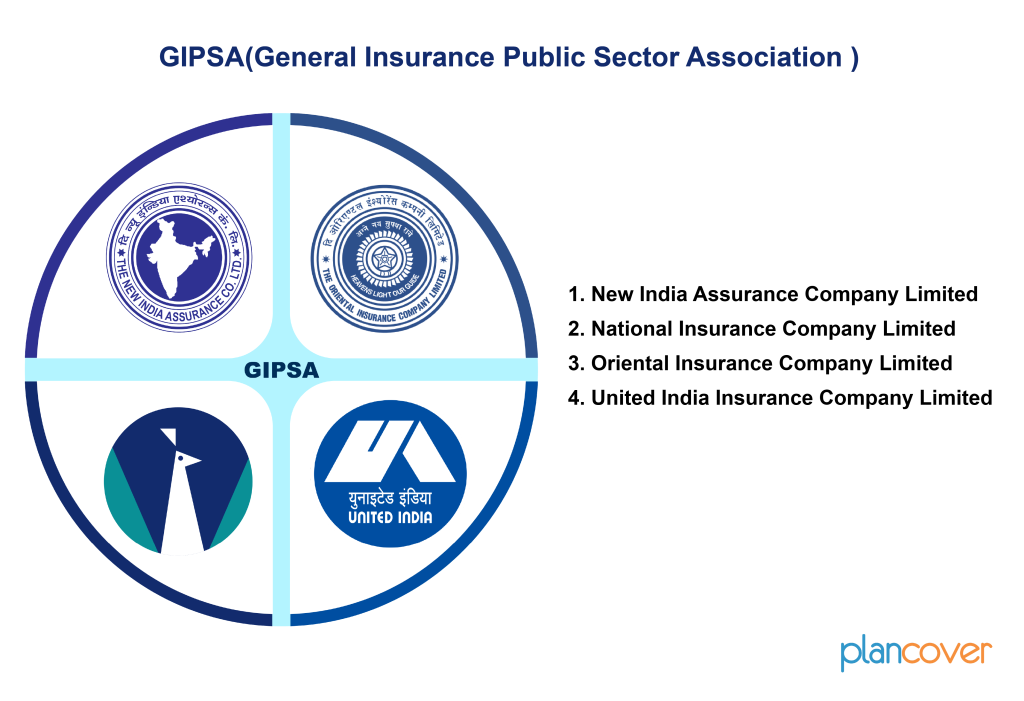What is GIPSA in health insurance?
GIPSA stands for General Insurance Public Sector Association established in 1964., GIPSA was created as a union of four public sector insurance companies: National Insurance Company Ltd., New India Assurance Company Ltd., Oriental Insurance Company Ltd., and United India Insurance Company Ltd. This collaboration aimed to streamline operations and enhance service delivery through mutual cooperation and synergy.

What Does GIPSA Do ?
1. Sets Fair Prices: GIPSA decides how much hospitals can charge for different treatments. So, if you need treatment for something, you know you won’t get overcharged.
2. Helps You Get Cashless Treatment: It makes sure you can get treated in certain hospitals without paying upfront. This is called “cashless” treatment. So, you don’t need to worry about paying immediately when you’re sick.
3. Looks After Policyholders: If you’re one of the people with insurance from these companies, GIPSA makes sure you’re treated right. If something goes wrong, they make sure you can complain and get it fixed
What’s in It for You as a Policyholder?
- No Surprises: You won’t get shocked by big bills because GIPSA keeps the costs fair and the rate is always fixed.
- Easy Access to Treatment: You can go to lots of hospitals without worrying about paying upfront. Just show your insurance card, and you’re good to go.
- Peace of Mind: You know you’re protected and won’t be taken advantage of when you’re unwell.
In Simple Words, GIPSA makes sure you get treated fairly and without stress when you’re sick. It’s like having a big friend looking out for you in the world of medical bills and insurance.
Below is a rank-order of tariff rates from lowest to highest
- Ayushaman Bharat
- CGHS & SGHS
- GIPSA
- Private Insurer
- Other Healthcare Plans
Can I apply a reimbursement claim for the main hospitalization treatment taken from a GIPSA Hospital?
Yes, you can apply for a reimbursement claim for the main hospitalization treatment taken from a hospital affiliated with GIPSA. However, it’s essential to understand that the insurer will only reimburse you according to the rates negotiated between GIPSA and that particular hospital for the specific treatment you received.
Let’s say, for instance, the GIPSA package for treating kidney stones at that hospital is set at Rs. 65,000. However, if your treatment cost exceeds this amount, like in the case where your bill is Rs. 100,000, the insurance company will still only reimburse you based on the agreed GIPSA package rate and your other policy terms.
If you find that the hospital is pressuring you to file a reimbursement claim instead of utilizing the cashless facility, it’s important to immediately inform your insurance company or Third Party Administrator (TPA) to resolve the issue. Additionally, ensure that all communications regarding this matter are documented in writing to prevent any further complications. Please do not hesitate to inform us in case of the above scenario.
How does the GIPSA rate calculate billing when there are multiple surgeries involved?
When there are multiple surgeries involved, the billing under the GIPSA rate is typically calculated as follows: the cost for the first surgery is 100% of the agreed package rate, for the second surgery it is 50% of the agreed package rate, and for any remaining surgeries, it will be 25% of the agreed package rate.
Let’s illustrate the scenario with an example:
Suppose a patient is admitted for multiple surgeries, specifically 4 surgeries. Here’s how the billing would be calculated based on the condition you provided:
1. For the first surgery, the hospital charges 100% of the agreed package rate set by GIPSA.
2. For the second surgery, the hospital charges 50% of the agreed package rate.
3. For the third and subsequent surgeries (if applicable), the hospital charges 25% of the agreed package rate for each additional surgery.
- Surgery 1 Cost : 100% of Rs. 300,000 = Rs. 300,000
- Surgery 2: 50% of Rs. 200,000 = Rs. 100,000
- Surgery 3: 25% of Rs. 80,000 = Rs. 20,000
- Surgery 4: 25% of Rs. 60,000 = Rs. 15,000
So, the total billing for all 4 surgeries would be:
Rs. 300,000 (Surgery 1) + Rs. 100,000 (Surgery 2) + Rs. 20,000 (Surgery 3) + Rs. 15,000 (Surgery 4) = Rs. 435,000